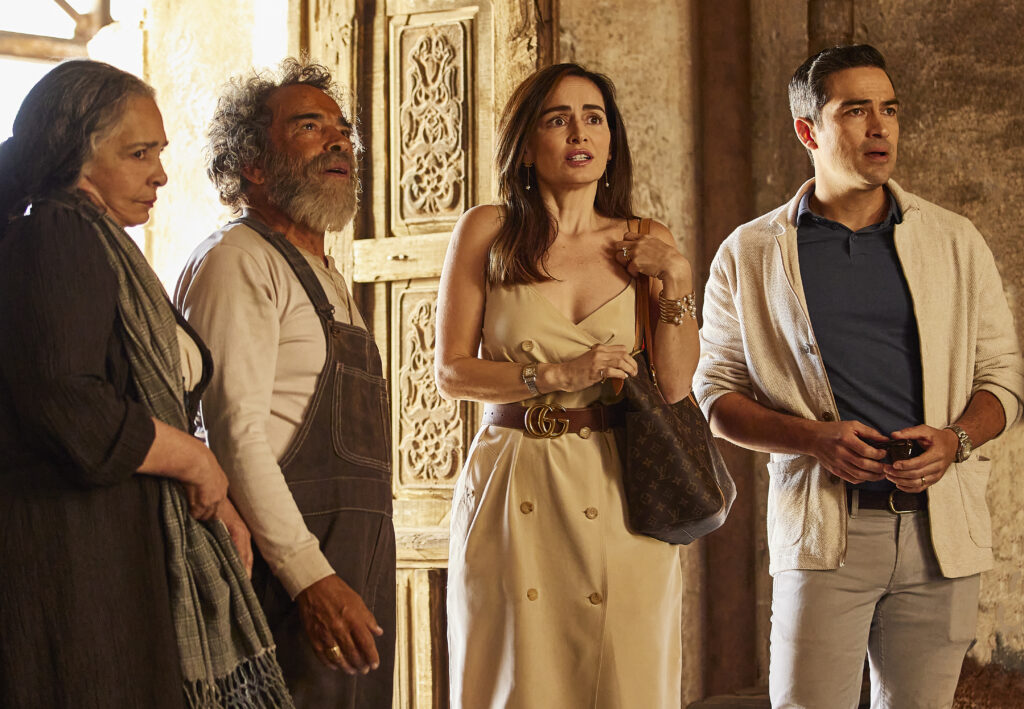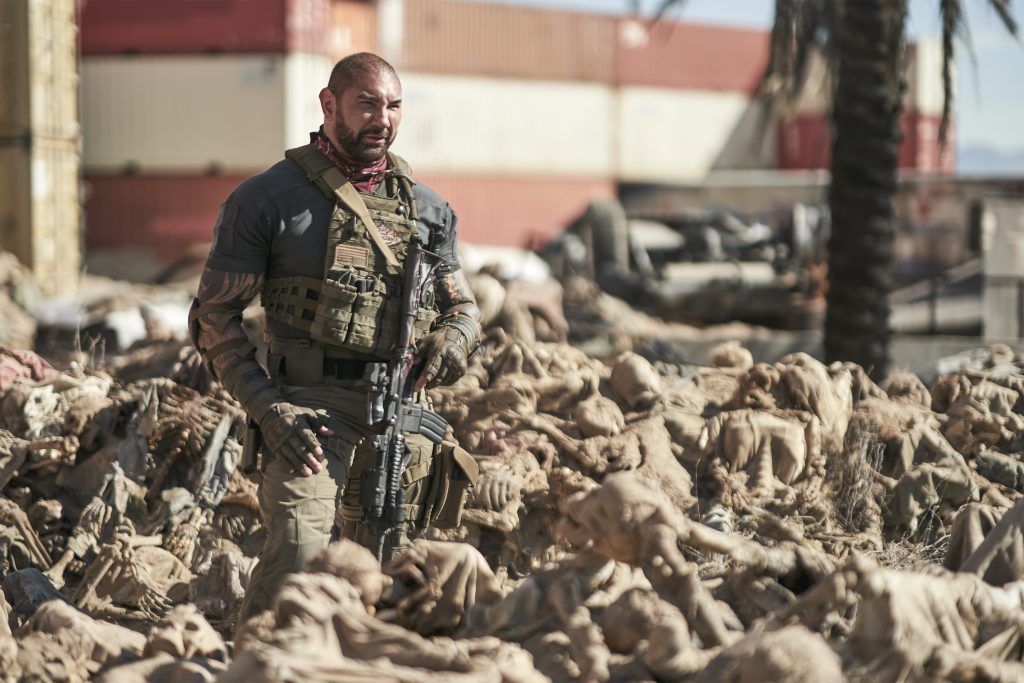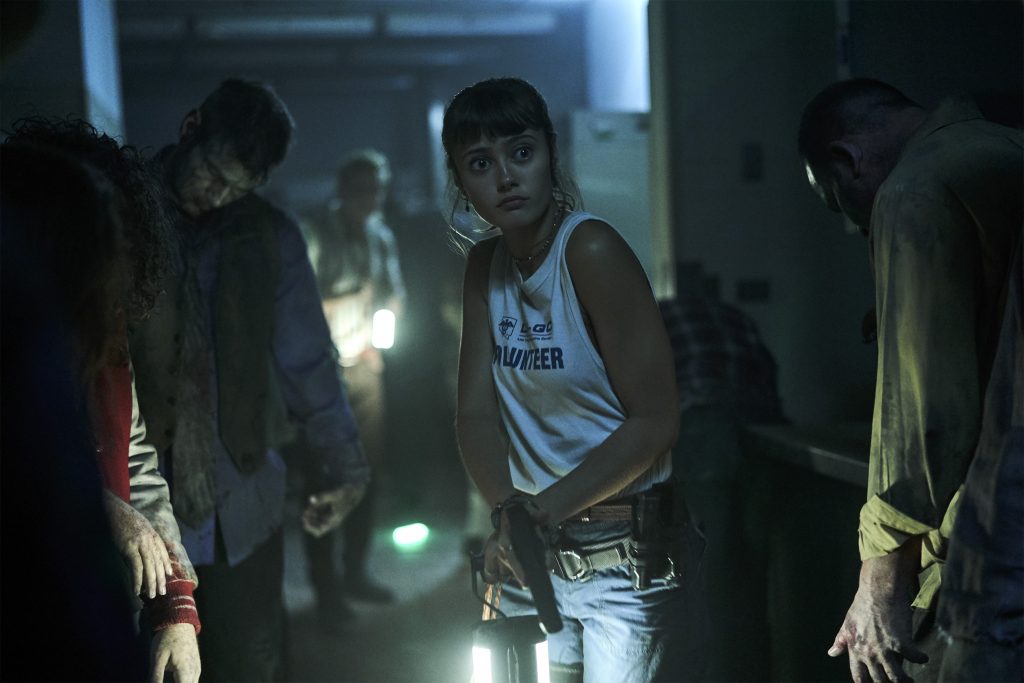March 24, 2023
by Carla Hay

Directed by Luis Estrada
Spanish with subtitles
Culture Representation: Taking place in Mexico City and the ficitional city of La Prosperidad, Mexico, the comedy film “¡Que Viva México!” features a predominantly Latino cast of characters (with some white people) representing the working-class, middle-class and wealthy.
Culture Clash: An upper-middle-class factory manager, who wants to forget that he came from a poor family, goes back to his hometown with his wife, two children and maid, after his paternal grandfather dies and leaves an inheritance of valuable gold that starts a family feud.
Culture Audience: “¡Que Viva México!” will appeal primarily to people who are fans of the movie’s headliners and like watching long-winded, unimaginative and tacky comedies.

What’s worse than a crude, repetitive, unfunny comedy that has nothing interesting to say? A crude, repetitive, unfunny comedy that has nothing interesting to say and drags on for 191 minutes. In other words, avoid this garbage movie at all costs. Yes, you read that correctly: the time-wasting “¡Que Viva México!” is three hours and 11 minutes long, which is annoyingly too long for a movie that is this stupid.
Directed by Luis Estrada (who co-wrote the movie’s terrible screenplay with Jaime Sampietro), “¡Que Viva México!” (which means “Hurray, Mexico!” in Spanish) was originally supposed to be a Netflix movie with a release date of November 16, 2022, the same date that the movie was scheduled for release in cinemas and on Netflix. But something went wrong with this distribution deal. Estrada (who is also the movie’s producer) has given interviews saying that he signed a deal with Sony Pictures International Productions for the theatrical release of “¡Que Viva México!” Netflix still retains streaming rights for the movie.
In the beginning of “¡Que Viva México!,” arrogant and selfish Pancho Reyes (played by Alfonso Herrera) is a senior general manager at a textile company’s main factory in Mexico City, where he oversees several workers. He is feared but not respected by his subordinates. In order to cut costs, Pancho has been firing employees, and the employees who remain must take on a heaver workload. Pancho takes delight in deciding how many people will be part of the layoffs because he likes having that power.
Pancho’s boss Jaime Sampaolo (played by José Sefami), who owns the company, is even more egotistical and ruthless than Pancho. The politically conservative Jamie hates unions, paying fair living wages, and liberal politicians. Jamie is also a misogynistic jerk who expects female employees to be nothing more than sexual playthings for their male bosses. Needless to say, Jaime hates the #MeToo movement, as he complains about it in a rant to Pancho.
One day, Jaime calls Pancho into Jaime’s office and praises Pancho on achieving high productivity for the company. Jaime doesn’t care how many employees were laid off by Pancho, as long as the company’s profits keep increasing. Jaime tells Pancho that Pancho is on track to be promoted to general corporate manager.
Throughout “¡Que Viva México!,” Pancho has nightmares that are phony scenes made to look like they are really happening to Pancho at the time, but then the scenes are revealed to be Pancho having a bad dream. These “nightmare” scenes are very gimmicky and quickly grow tiresome. These “nightmare” scenes are also lazy and unimaginative ways of stretching the total running time for the movie.
“¡Que Viva México!” opens with one such nightmare scenario, where Pancho and his snobby wife Maria Elena, nicknamed Mari (played by Ana de la Reguera), are having a black-tie dinner with other guests at what looks like a country club or high-end resort. Jaime congratulates Pancho for being a senior general manager at the company, despite coming from a shady background. One of the movie’s main themes is that Pancho is ashamed of his working-class family whom he left behind in his hometown of the fictional La Prosperidad, Mexico. Pancho thinks these family members are trashy.
Suddenly, this stuffy party is interrupted by two elderly men carrying rifles and pointing these guns at the guests. These intruders are Pancho’s father Rosendo Reyes (played by Damián Alcázar) and Rosendo’s father Francisco (played by Joaquín Cosio), who both say that they don’t want any money. Pancho’s father and paternal grandfather say that they just want revenge for Pancho being so ungrateful for their sacrifices, such as paying for Pancho’s college education. Just as it looks like Pancho will be shot, he wakes up from this nightmare.
Mari knows about Pancho’s nightmares, and she keeps telling him to go see a therapist. In response, Pancho yells at her and says that she shouldn’t judge him because he knows all about how her “white trash family” got their money. Mari’s nationality is Mexican, but there are several mentions in the movie that she identifies her race as white, because her family is descended from white Europeans.
Mari is a hollow stereotype of a self-absorbed and materialistic “trophy wife.” Mari is also very rude to the family’s maid Lupita (played by Sonia Couoh), who has a kind and easygoing personality. For example, when Lupita makes a harmless comment about something in the household, Mari tells Pancho in a mean-spirited hushed tone that Lupita is being difficult. “She thinks she’s one of us,” hisses Mari.
Pancho and Mari have two children: son Tony (played by Raphael Camarena) and daughter Cati (played by Mayte Fernández), who look like they might be twins, although the movie doesn’t really say for sure. The children are about 7 or 8 years old. These kids are also the only characters in the movie who aren’t made to look foolish or awful. All of the other cast members play into how their characters were written: as bad parodies.
One day, Pancho gets several calls at home and at work from his father Rosendo. Pancho keeps deliberately avoiding these calls because he doesn’t want to talk to his father. In fact, he doesn’t really want anything to do with his family members who still live in shabby living conditions in La Prosperidad, including his mother Dolores (played by Ana Martin). Pancho hasn’t had contact with these relatives in many years. He hasn’t even met most of them yet.
However, Pancho eventually takes Rosendo’s call and finds out that Rosendo’s father Francisco died a few days earlier. Francisco was a miner, and the family has found out that Francisco had a secret will. There is speculation that Francisco, who was always looking for gold treasure, might have hidden gold that will be passed on to someone in the family through an inheritance.
Therefore, Pancho agrees to go to La Prosperidad out of greed, not out of grief. He decides to ask for a three-week leave of absence from his job. Mari, Tony, Cati and Lupita are also on this trip. Pancho’s relatives live in an isolated, underdeveloped area. And you know what that means.
Because this moronic movie is very phony-looking and illogical, “¡Que Viva México!” contrives the story around Pancho and his family entourage being “forced” to live in squalid conditions in the family compound, where there are no indoor toilets, no cell phone service and no Internet service. Viewers are supposed to believe that Pancho and Mari can’t figure out a way to find a comfortable hotel.
The Reyes family in La Prosperidad is a large, boisterous and argumentative clan. All these extra characters are mainly in the movie to have several people yell at each other in conflicts that mostly go nowhere. It’s yet another way that “¡Que Viva México!” wastes a lot of time. Pancho sees most of these relatives for the first time in several years when he goes to La Prosperidad for Francisco’s funeral and to see what he can get from whatever inheritance was left for Pancho. A corrupt priest named Father Ambrosio (also played by Alcázar) plays a big role in what happens in the story.
The members of this La Prosperidad family include Pancho’s six siblings: brother Rosendo Jr., nicknamed Rosendito (also played by Cosio), who grabs Pancho by Pancho’s genitals when Pancho and Rosendito see each other for the first time in years; sister Socorro (played by Zaide Silvia Gutiérrez), who is described as a “religious prude” by her father; brother Hilario (played by Luis Fernando Peña), who is called “the artist of the family”; brother Rufino (played by Álex Perea), who is described as “the black sheep of the family” and who immediately grabs Mari in a sexually suggestive manner; transgender sister Jacinta (played by Cuauhtli Jiménez), whose former name was Jacinto; and pregnant, unmarried sister Bartola (played by Vico Escorcia), who has six other children. All of Bartola’s children have different deadbeat fathers.
The significant others of Pancho’s siblings include Socorro’s “poet” husband Cruz (played by Enrique Arreola), who uses crutches and who used to be a teacher; Hilario’s wife Pánfila (played by Natalia Quiroz), who is so forgettable that Rosendo Sr. can’t remember her name; Rufino’s promiscuous girlfriend Gloria López (played by Mayra Hermosillo), who immediately flirts with Pancho; and Jacinta’s husband Guadalupe “El Lupe” Flores (played by Fermín Martínez), who pretends to be a loving partner but is actually abusive. Rounding out this dysfunctional family are Francisco’s widow Pascuala (played by Angelina Peláez); Rosendo’s brother Regino (also played by Alcázar); and Regino’s son Reginito (also played by Cosio), who is very competitive with his cousins.
“¡Que Viva México!” has a lot of sexist and tacky scenes where any woman under the age of 50 is treated as a target for sexual harassment, or depicted as existing only to give sexual pleasure to men. Pancho has no qualms about cheating on Mari, but when he finds out that she might be tempted to cheat on him, he goes ballistic with jealousy and rage. Mari’s decisions on whether or not to cheat on Pancho are always made when she’s drunk, so the movie has a loathsome scenarios where certain people try to shame, embarrass, or take advantage of Mari while her judgment is impaired by alcohol.
“¡Que Viva México!” also has several crass scenarios involving bodily functions. A low point is when someone defecates on Francisco’s grave, and the movie shows the graphic details, with no discreet editing. What that person does to Francisco’s grave is like what “¡Que Viva México!” does to any viewer’s hope that “¡Que Viva México!” could actually turn into a good movie.
Sony Pictures International Productions released “¡Que Viva México!” in select U.S. cinemas on March 24, 2023. The movie was released in Mexico on March 23, 2023. Netflix will premiere “¡Que Viva México!” on May 11, 2023.


